Best Generators for Hurricane Season Preparedness 2024
- October 10, 2024
- 0 comment
When preparing for hurricane season, having a reliable generator is essential to ensure your family’s safety and comfort during power outages. Hurricanes, with their high winds and flooding, often leave entire communities without power for days or even weeks. Therefore, choosing the right generator is crucial.

Table of Contents:
- GP Series 8000E Portable Generator
- Champion 100416 – 8000/10000W Tri Fuel Generator
- Generac Guardian 24kW – Whole House Generator
- What Size Generator Do You Need for a Hurricane?
- Maintenance and Safety Considerations
Why a Generator is Important During Hurricanes
Hurricanes frequently disrupt power grids, leaving many without electricity for extended periods. Generators provide an essential backup, keeping lights on, refrigerators running, and critical appliances powered.
Whether you’re dealing with Category 1 or stronger storms, a generator can help mitigate the inconvenience and risks associated with long-term power loss, especially when access to fuel, supplies, and emergency services is limited.
Features to Look for in a Hurricane Generator:
When selecting a generator for hurricane preparedness, several features are critical:
- Fuel Type: Dual-fuel and tri-fuel generators are highly recommended. These models allow you to run on propane, gasoline, or natural gas, which can be invaluable if one fuel type is scarce.
- Power Output: Depending on the size of your home and essential appliances, you’ll need to calculate how many watts are required. A minimum of 7,500 watts is typically recommended to power refrigerators, lights, and small air conditioning units.
- Durability: Hurricanes bring intense weather conditions, so a generator must be rugged, weather-resistant, and easy to maintain.
- Portability: For homes without permanent installations, portable generators are a practical choice. However, they should be easy to move and feature electric or remote start options.
- Run Time: Consider how long a generator can run on a full tank or a propane tank to minimize refueling during extended outages.
Best Types of Generators for Hurricanes
Hurricane-ready generators are typically categorized into two types: portable and standby generators.
- Portable Generators: These are great for temporary or flexible power needs. They can be moved to different locations and typically require manual fueling and starting.
- Standby Generators: These are more permanent solutions. They automatically kick in when the power goes out and are directly wired into your home’s electrical system.
1. GP Series 8000E Portable Generator
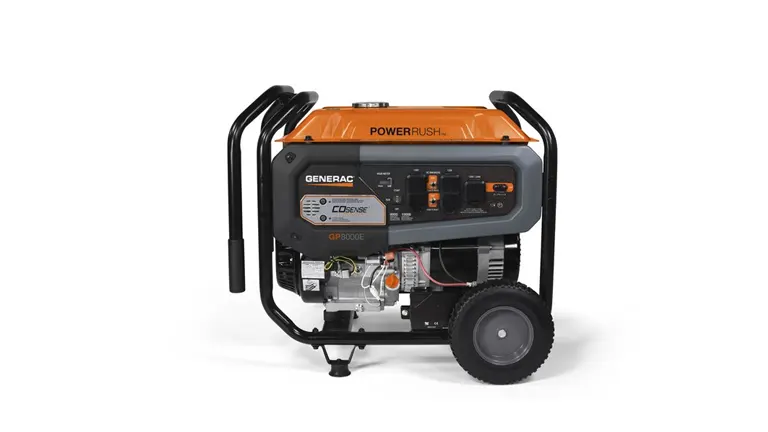
Pros:
- Sturdy construction and good portability.
- Provides sufficient power for essential appliances and small air conditioning units.
- Durable and easy to start with the electric starter.
Cons:
- Gasoline-only model, which can be a limitation if gas is in short supply.
The Generac GP8000E is an excellent portable generator, designed for both ease of use and durability. It features PowerRush™ Technology, delivering 30% more starting power, which is ideal for running appliances with high startup demands.
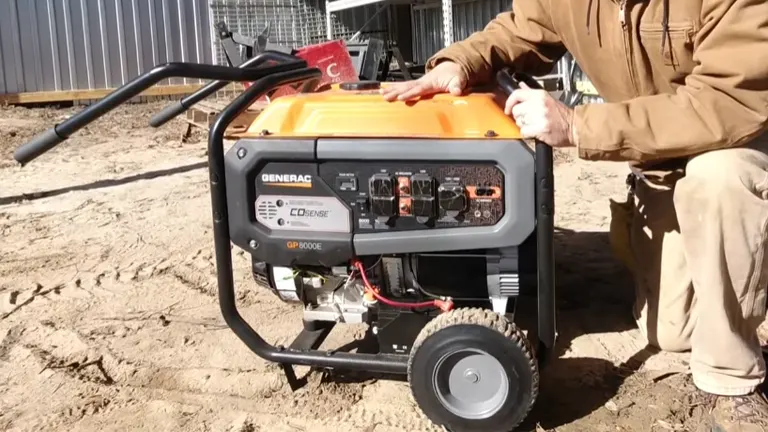
Its electric start and built-in battery charger make it user-friendly, ensuring readiness during emergencies. The robust OHV engine and steel fuel tank provide reliable, long-term performance with up to 11 hours of runtime at 50% load. Built for tough environments, it includes flat-free wheels, a fold-down handle, and covered outlets for added protection.
Product Features:
- Electric start.
- Runs on gasoline.
- Large fuel tank with up to 11 hours of run time at 50% load.
Best For: Homes needing portable power for essential needs like lighting, refrigeration, and small HVAC units.
2. Champion 100416 – 8000/10000W Tri Fuel Generator
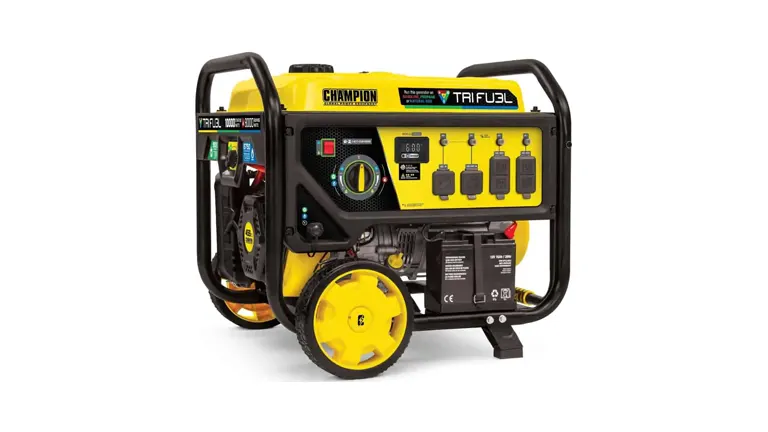
Pros:
- Powerful output that can support larger appliances or even a small home.
- Dual-fuel gives flexibility during fuel shortages.
Cons:
- Slightly bulkier and heavier compared to smaller models.
The Champion 100416 is a versatile generator that runs on gasoline, propane, or natural gas, providing flexibility during power outages. It delivers 8,000 running watts (10,000 peak) on gasoline, 7,200 running watts on propane, and 7,000 watts on natural gas.
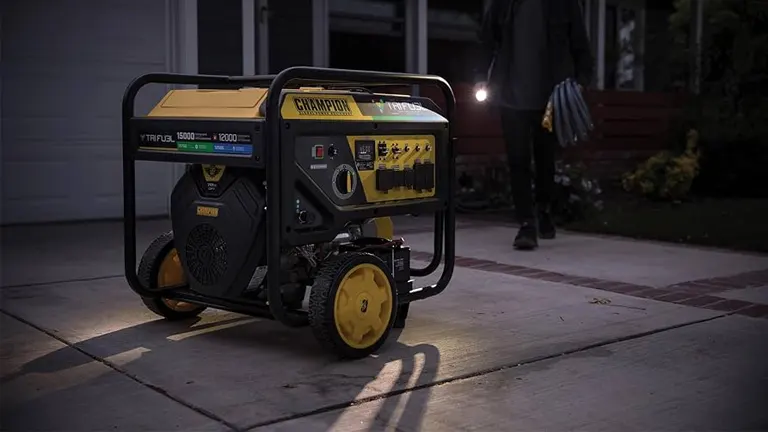
It features both electric and recoil start systems, and its EZ Start Dial simplifies control. The generator runs up to 12.5 hours on a full gas tank and has a noise level of 74 dBA. However, its high THD (under 20%) makes it unsuitable for sensitive electronics.
Product Features:
- Dual-fuel capability (gasoline and propane).
- Electric start with IntelliGauge monitoring system.
- Runs 8-10 hours on gasoline.
Best For: Medium to large homes that require extra power during outages.
Best Standby Generators for Hurricane Season
Standby generators provide a more permanent solution for hurricane preparedness. These units are professionally installed and connected to your home’s electrical system, providing seamless power when the grid fails.
3. Generac Guardian 24kW – Whole House Generator
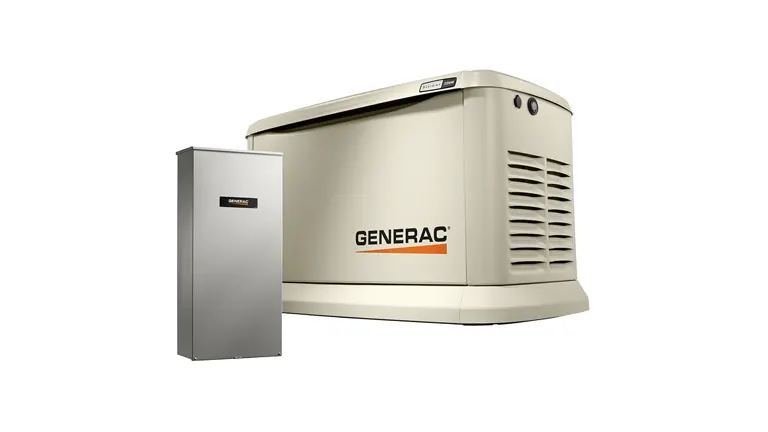
Pros:
- Large power capacity for whole-home coverage.
- Low maintenance with automatic operation.
- Extended run times due to natural gas or large propane tanks.
Cons:
- More expensive due to installation and unit costs.
- Requires professional installation.
The Generac Guardian 24kW is a powerful, reliable standby generator designed for whole-house backup during power outages. Its True Power Technology ensures utility-grade power with less than 5% total harmonic distortion, making it safe for sensitive electronics.
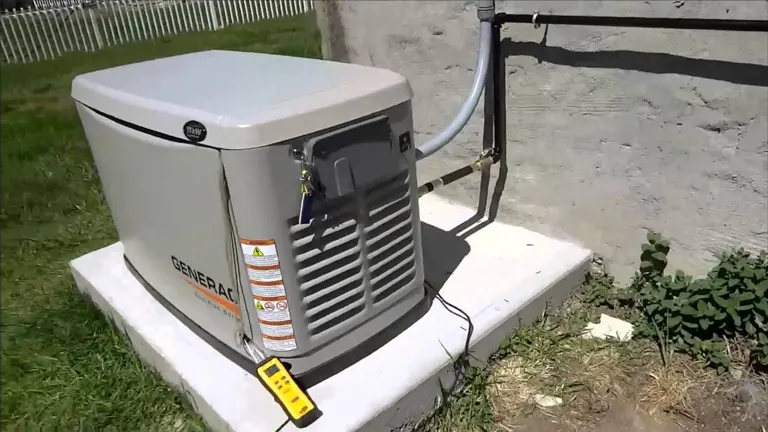
The G-Force engine, built in the USA, is durable, requiring minimal maintenance even in extreme conditions. It features smart Evolution Controls with user-friendly displays, maintenance alerts, and Mobile Link monitoring. The corrosion-resistant aluminum enclosure ensures long-lasting performance, while its Quiet-Test mode minimizes noise and fuel use during self-tests.
Product Features:
- Runs on natural gas or propane.
- Automatically starts within seconds of an outage.
- Can power most large homes entirely, including HVAC systems.
Best For: Homeowners seeking comprehensive, automatic power for large homes during hurricane outages.
What Size Generator Do You Need for a Hurricane?
Sizing your generator is one of the most important decisions you’ll make. Here are general guidelines:
- 5000-7500 Watts: Powers essential items like refrigerators, lights, and small air conditioners. A smaller generator like this is ideal for those who need basic comfort and functionality.
- 7500-12,000 Watts: These units can support more appliances, such as larger HVAC systems, sump pumps, and multiple refrigerators, making them ideal for medium-sized homes.
- 14,000-26,000 Watts: Large, whole-home generators that can keep everything in your home running, including all major appliances, heating/cooling systems, and water heaters.
Make sure to calculate your power needs by adding the wattages of all the appliances you plan to run simultaneously. Be sure to account for both running and starting wattage, especially for items like refrigerators and air conditioners, which require more power to start than to run continuously.
Maintenance and Safety Considerations
Proper maintenance is essential for reliable generator performance:
- Oil Changes: Depending on the model, generators need an oil change after every 25-100 hours of use.
- Storage: Store generators in a dry, covered space when not in use. Avoid running them indoors or in enclosed spaces due to carbon monoxide risk.
- Fuel Management: If using gasoline, add stabilizer to prevent the fuel from breaking down during storage.
Final Conclusion
Choosing the best generator for hurricane season depends on your home size, power needs, and budget. For those needing flexibility and mobility, portable generators like the Generac GP8000E or Champion 100416 are great choices. If you’re looking for a hands-free, robust solution, standby generators such as the Generac Guardian 24kW provide whole-home coverage with the peace of mind that power will be restored automatically.
Being prepared with the right generator means you can maintain comfort and safety when the power grid is compromised during hurricane season.
Frequently Asked Questions (FAQs)
- How much power does the Generac Guardian 24kW provide?
It provides 24,000 watts, enough to power an entire home, including HVAC systems. - Is the generator safe for sensitive electronics?
Yes, with less than 5% total harmonic distortion, it’s safe for sensitive devices. - What kind of engine does it use?
It has a durable Generac G-Force engine designed for reliability and low maintenance. - Does it require frequent maintenance?
No, the engine is designed for minimal maintenance compared to others in its class. - Can I monitor the generator remotely?
Yes, it includes Mobile Link for remote monitoring via smartphone, tablet, or PC. - How noisy is the generator?
It features a Quiet-Test mode for lower noise during self-testing. - What kind of weather protection does it have?
The aluminum enclosure is corrosion-resistant and weatherproof. - How does the generator start during a power outage?
It automatically starts when it detects a power interruption, ensuring seamless backup.
We hope this guide has helped you choose the right generator for hurricane season. Have tips or experiences with storm prep? Share your thoughts below to help others stay prepared. Be sure to pass this guide to anyone looking to protect their home during extreme weather. Together, we can stay safe when hurricanes hit!

Benjamin Brooks
Forestry AuthorGreetings! I'm Benjamin Brooks, and my journey over the past 15 years has revolved around the fascinating realms of content creation, expertise in snow clearing, and the intricate world of lumberjacking and landscaping. What began as a simple curiosity about the natural world and heavy machinery has evolved into a passionate profession where my love for crafting words intertwines seamlessly with my lumberjacking and garden skills.

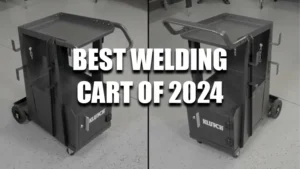
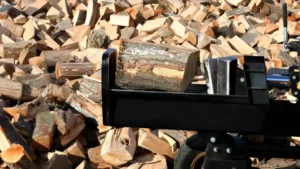










Leave your comment